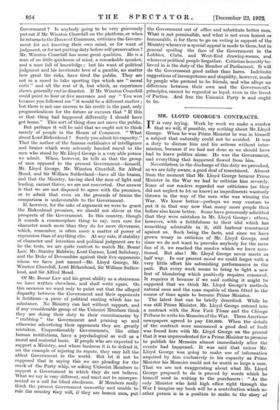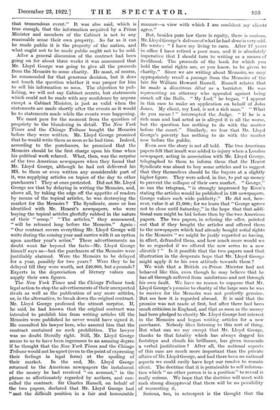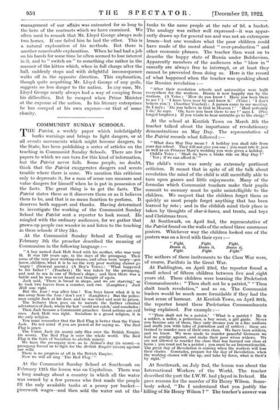MR. LLOYD GEORGE'S CONTRACTS.
IT is very trying. Week by week we make a resolve that we will, if possible, say nothing about Mr. Lloyd George. When he was Prime Minister he was in himself a subject that naturally could not be avoided. It was a duty to discuss him and his actions without inter- mission, because if we had not done so we should have had to leave politics alone. He was the Government, and everything that happened flowed from him.
Nevertheless, in the discharge of this duty we provoked, as we are fully aware, a good deal of resentment. Almost from the moment that Mr. Lloyd George became Prime Minister in the War we had to criticize him severely. Some of our readers regarded our criticisms (as they did not neglect to let us know) as impediments wantonly thrown in the way of the man who was winning the War. We knew better—perhaps we may venture to put it in that way now that many more people than before also know better. Some have generously admitted that they were mistaken in Mr. Lloyd George ; others, however, with a faithfulness to their idol which has something admirable in it, still harbour resentment against us. Such being the facts, and since we have grown weary in criticism of Mr. Lloyd George, and since we do not want to provoke anybody for the mere fun of it, we reached the resolve which we have men- tioned. But alas I Mr. Lloyd George never meets us half way. In our present mood we could forget with a very little effort his astonishing performances in the past. But every week seems to bring to light a new feat of blundering which positively requires comment. It requires it because if we said nothing it might be supposed that we think Mr. Lloyd George's methods natural ones and the man capable of them fitted in the course of time again to become Prime Minister.
The latest feat can be briefly described. While he was still Prime Minister, Mr. Lloyd George entered into a contract with the New York Times and the Chicago Tribune to write his Memoirs of the War. These American newspapers agreed to pay £40,000. When the details of the contract were announced a good deal of fault was found here with Mr. Lloyd George on the ground that it was unprecedented for a Prime Minister to promise to publish his Memoirs almost immediately after the events had happened. It was said that unless Mr. Lloyd George was going to make use of information acquired by him exclusively in his capacity as Prime Minister his Memoirs could not be worth so large a sum. That we are not exaggerating about what Mr. Lloyd George proposed to do is proved by words which he himself used in writing to the purchasers : " As the only Idinister who held high office right through the War I imagine my book will be a contribution which no other person is in a positicin to make to the story of that tremendous event." It was also said, which is true enough, that the information acquired by a Prime Minister and members of the Cabinet is not in any reasonable sense their own property. So far as it can be made public it is the property of the nation, and what ought not to be made public ought not to be sold.
After a general discussion of the contract had been going on for about three weeks it was announced that Mr. Lloyd George was going to give all the proceeds from the Memoirs to some charity. He must, of course, be commended for that generous decision, but it does not touch the question whether it was proper for him to sell his information so soon. The objection to pub- lishing, we will not say Cabinet secrets, but statements which could not be made with any confidence by anyone except. a Cabinet Minister, is just as valid when the statements are made shortly after the events as it would be to statements made while the events were happening.
We must pass for the moment from the question of propriety to the blundering in detail. The New York Times and the Chicago Tribune bought the Memoirs before they were written. Mr. Lloyd George promised that he would write them as soon as he had time. Indeed, according to the purchasers, he promised that the Memoirs should be the first charge upon his time when his political work relaxed. What, then, was the surprise of the two American newspapers when they found that Mr. Lloyd George, although he had not delivered his MS. to them or even written any considerable part of it, was supplying articles on topics of the day to other purchasers ! They at once protested. Did not Mr. Lloyd George see that by delaying in writing the Memoirs, and, above all, by taking the edge off the appetite of readers by means of the topical articles, he was destroying the market for the Memoirs ? The Syndicate, more or less identified with Mr. Hearses newspapers, who were buying the topical articles gleefully rubbed in the nature of their " scoop." " The articles," they announced, " will be released long before the Memoirs." Again : " Our contract covers everything Mr. Lloyd George will write during the coming year and carries with it an option upon another year's series." These advertisements no doubt went far beyond the facts—Mr. Lloyd George himself says so—but the purchasers of the Memoirs were justifiably alarmed. Were the Memoirs to be delayed for a year, possibly for two years ? Were they to be delayed till they were worth, not £40,000, but x pounds ? Experts in the depreciation of literary values can supply their own figures.
The New York Times and the Chicago Tribune took legal action to stop the advertisements of their unexpected rivals as well as the publication of any more articles, or, in the alternative, to break down the original contract. Mr. Lloyd George professed the utmost surprise. If, he said, he had known that the original contract was intended to prohibit him from writing articles till the Memoirs were published he never would have signed it. He consulted his lawyer here, who assured him that the contract contained no such prohibition. The lawyer was no doubt literally right. Still, Mr. Lloyd George seems to us to have been ingenuous to an amazing degree if he thought that the New York Times and the Chicago Tribune would not be upset (even to the point of expressing their feelings in legal form) at the spoiling of their market. In the end, Mr. Lloyd George returned to the American newspapers the instalment of the money he had received " on account," in the phrase so affectionately regarded by authors, and can- celled the contract. Sir Charles Russell, on behalf of the two papers, declared that Mr. Lloyd George had " met the difficult position in a fair and honourable manner—a view with which I am confident my clients agree."
But, besides pure law there is equity, there is custom. Mr. Lloyd George's defence of what he had done is very odd.
He wrote : " I have my living to earn. After 17 years in office I have retired a poor man, and it is absolutely imperative that I should turn to writing as a means of livelihood. The proceeds of the book for which you hold the serial rights are, as you know, to be given to charity." Since we are writing about Memoirs, we may appropriately recall a passage from the Memoirs of the late Sir William Howard Russell. Russell relates that he made a disastrous debut as a barrister. He was representing an attorney who appealed against being struck off the Rolls. " My Lud," he began, " I appear in this ease to make an application on behalf of John Jones. My client, my Lud, is not a rich man." " What do you mean ? " interrupted the Judge. " If he is a rich man and had acted as is alleged it is all the worse, but the question has nothing to do with the matter before the court." Similarly, we fear that Mr. Lloyd George's poverty has nothing to do with the matter now before the public.
Even now the story is not all told. The two American papers felt insult was added to injury when a London newspaper, acting in association with Mr. Lloyd George, telegraphed to them to inform them that the Hearst Syndicate was about to buy some articles and' to suggest that they themselves should be the buyers at a slightly higher figure. They were asked, in fine, to put up money to prevent the collapse of their own market. "'George," so ran the telegram, " is strongly impressed by Keen's stating the articles would be published in 150 newspapers. George values such wide publicity." He did not, how- ever, value it at 11,000 ; for we learn that' "'George agrees not to close until Saturday," in the hope that that addi- tional sum might be bid before then by the two American papers. The two papers, in refusing the offer, pointed out that if they bought the articles and offered them to the newspapers which had already bought serial rights in the Memoirs " we might be justly regarded as having, in effect, defrauded them, and how much more would we be so regarded if we offered the new series to a new clientele?" Is it possible that the two papers used that illustration in the desperate hope that Mr. Lloyd Georgc might apply it to his own attitude towards them ?
We wish that a British ex-Prime Minister had not behaved like this, even though he may believe that he has all through suffered from misfortune and not through his own fault. We have no reason to suppose that Mr.
Lloyd George's promise to charity of the large sum he was to receive for the Memoirs was not perfectly genuine. But see how it is regarded abroad. It is said that the promise was not made at first, but after there had been much criticism in England, and that as soon as the money had been pledged to charity Mr. Lloyd George lost interest in the Memoirs and began writing articles for a new purchaser. Nobody likes listening to this sort of thing. But what can we say except that Mr. Lloyd George, thanks to that fatality which has always dogged his footsteps and clouds his brilliance, has given innuendo a verbal justification ? After all, the national aspects of this case are much more important than the private affairs of Mr. Lloyd George, and had there been no national aspects we could easily have kept our resolve to remain silent. The doctrine that it is permissible to sell informa- tion which " no other person is in a position" to reveal is really serious. We hope that the doctrine will meet with such strong disapproval that there will be no possibility of reasserting it.
Serious, too, in retrospect is the thought that the management of our affairs was entrusted for so long to the hero of the contracts which we have examined. We often used to remark that Mr. Lloyd George always rode two horses. If one failed him he had the other. This is a natural explanation of his methods. But there is another conceivable explanation. When he had had a job on his hands for some time he often seemed to lose interest in it, and to " switch on " to something else rather in the manner of the kitten which, when in full charge after the ball, suddenly stops and with delightful inconsequence walks off in the opposite direction. This explanation, though quite acquitting Mr. Lloyd George of any guile, suggests no less danger to the nation. In any case, Mr. Lloyd George nearly always had a way of escaping from his difficulties. But he escaped when Prime Minister at the expense of the nation. In his literary enterprises he has escaped at his own expense—or that of some charity.












































 Previous page
Previous page